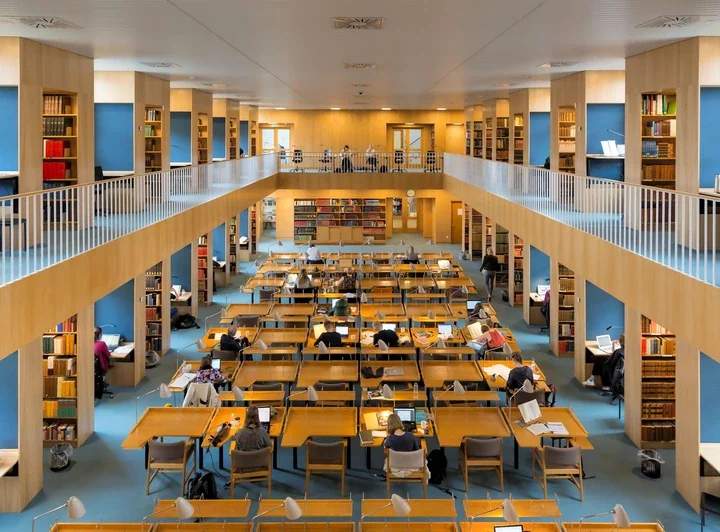Ever wonder what the difference is between all those libraries you see around town? Like public libraries, school libraries, academic libraries. They may look similar on the outside, but on the inside, they serve very different purposes. The books, resources, and services offered at each type cater to their specific users and communities. In this article, we’ll break down the major types of libraries, look at their unique functions and features, and help you understand exactly what role each type plays. You’ll learn the key differences between public, school, academic, and special libraries. You’ll discover which type is best suited for your own interests and needs, whether you’re a student, scholar, reader, or lifelong learner.
What Is a Library?
A library is a place where knowledge and information are stored in the form of books, magazines, newspapers, journals, etc. The main purpose of any library is to provide resources and services for learning, research, and education. At its core, a library is a collection of information and resources for public use. Historically, libraries contained mostly books and periodicals. Today, libraries offer so much more, such as e-books, audiobooks, movies, music, online resources, and community meeting spaces.
Types of Libraries
There are different kinds of libraries that serve various functions. Public libraries provide resources for the general public and often offer events and classes for all ages. Academic libraries support schools, colleges, and universities. Special libraries are found at organizations like hospitals, corporations, and government agencies.
Academic Libraries
Academic libraries are found in colleges, universities, and other institutions of higher education. They primarily serve the needs of students, professors, and researchers by providing access to scholarly resources and study spaces.
The collections in academic libraries focus on academic subjects taught at the institution, like history, science, and literature. You’ll find books, academic journals, conference papers, and more. Many also provide access to digital resources like ebooks, online journals, and research databases.
The main purpose of an academic library is to support the curriculum of its institution. So, the collections are tailored to the courses offered on campus. They aim to provide students and faculty with the resources they need for learning, teaching, and conducting research.
Public Library
Public libraries are open for public access and provide free services to communities. They offer a quiet space for reading, studying, and relaxing. They house a wide range of fiction and non-fiction books, newspapers, magazines, audiobooks, and movies for people of all ages.
Libraries also provide free access to computers and the Internet for those who may not otherwise have access. Many libraries offer free programs and classes for all ages, such as story time for children, book clubs for adults, and free tutoring or skills training.
Public libraries depend on funding from local and federal governments and private donations to operate. They provide an important public service by giving communities free access to information and resources for learning and enjoyment.
School Library
The school library is located within the school building and aims to provide resources for students to expand their knowledge. The primary purpose of a school library is to support the curriculum and learning needs of students.
School libraries are a crucial part of any school. They provide resources for students to improve their knowledge and skills. It has fiction and non-fiction books, reference materials like encyclopedias and dictionaries, magazines, and newspapers. Students can borrow resources like books, ebooks, audiobooks, and DVDs.
Special Library
Special libraries are information centers set up by special institutions like government departments, research institutions, associations, museums, hospitals, etc., to cater to the specialized information needs of the parent organizations.
A special library focuses on a particular subject area or client group. It provides in-depth information resources and services tailored to the needs of a specific organization or industry. For example, a special library may serve a law firm, hospital, government agency, or corporation. It typically contains materials related to the mission and work of its parent organization.
Digital Library
A digital library is a library that stores collections in electronic formats and is accessible via digital tools. Rather than physical books, they contain e-books, digital copies of print books, online journals, and articles.
They offer many benefits over traditional libraries:
Accessibility: Materials can be accessed remotely 24/7. No physical visit is required.
Searchability: Collections are indexed and fully searchable. You can find what you need quickly.
Preservation: Digital materials do not deteriorate like physical books. They remain pristine no matter how often they are accessed.
Storage: A vast collection can be stored in a small physical space. No need for huge buildings.
Cost: It’s more affordable to maintain a digital library versus a physical one.
Sharing: Digital materials can easily be shared and accessed by many people at once....Read Full Article [Click Here>]
So, if you want a library at your fingertips that’s open all hours, a digital library is the modern solution. While not quite the same as browsing physical book stacks, it offers significant advantages for learning and research in the digital age.
Medical Library
A medical library focuses on health sciences and supports the information needs of hospitals, medical schools, physicians, nurses, and health care researchers. It provides access to medical journals, textbooks, and databases.
The collection includes print and digital books, journals, and databases covering medicine, nursing, pharmacy, dentistry, and allied health. Librarians can help you search medical literature and find evidence for clinical decisions or research topics. Medical libraries may offer services like interlibrary loans, printing, scanning, and copying.
Some well-known medical libraries in Nigeria are the National Hospital Abuja Medical Library and The Latunde Odeku Medical Library, College of Medicine, University of Ibadan. Medical libraries play an important role in advancing health and improving lives by organizing and providing access to health information when and where people need it.
Slide Library
A slide library contains a collection of slides on a particular topic or subject. The slides can be text, images, or a combination of both. The main purpose of a slide library is to allow reuse of slides in different presentations.
For example, a company may build a slide library with an overview of the company, products, services, processes, etc. Presenters can then pick and choose relevant slides for their presentations instead of creating new slides from scratch for each presentation. The slide library promotes consistency in messaging across presentations and saves time.
Some tips for creating an effective slide library:
Organize slides into categories and subcategories for easy navigation.
Include a mix of content like stats, facts, examples, case studies, quotes, etc.
Use a consistent template and style for all slides.
Review and update slides regularly to keep content current.
Allow collaborators to suggest new slides or edits to existing ones.
Make the slide library easily accessible to anyone who needs to create a presentation.
A well-designed slide library is a valuable resource for any organization. It ensures consistent and compelling content in all of your presentations.
Archival Library
Archival libraries contain materials of research and historical significance. Their collections are non-circulating, meaning materials do not leave the library. Researchers visit the archive to access rare books, documents, letters, photographs, maps, and more.
Archival libraries require controlled environments to properly preserve their aging collections. Low light levels and regulated temperature and humidity are essential for conservation. Due to the fragile nature of materials, archivists carefully monitor how frequently certain items can be accessed or reproduced.
Mobile Library
A mobile library is a library housed in a vehicle that travels to locations to provide library services. It aims to serve communities that lack a public library.
The mobile library vehicle, typically a specially converted van, bus, or truck, contains a variety of reading materials like books, newspapers, and magazines, which people can borrow for a fixed time period. It visits schools, community centers, and rural areas on a rotating schedule. For some, it’s the only access to a library in their area.
Mobile libraries play an important role in promoting literacy and education in underserved communities. They make knowledge and information more accessible to all.





